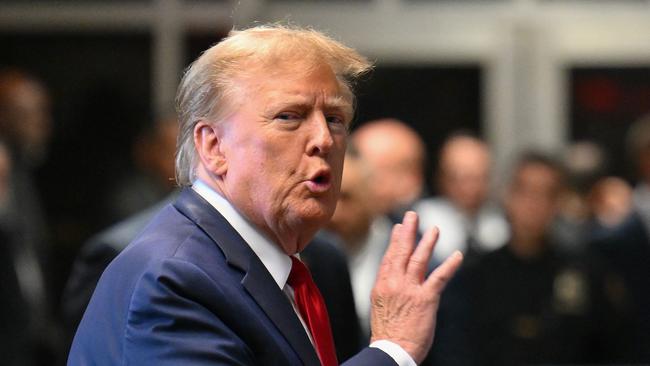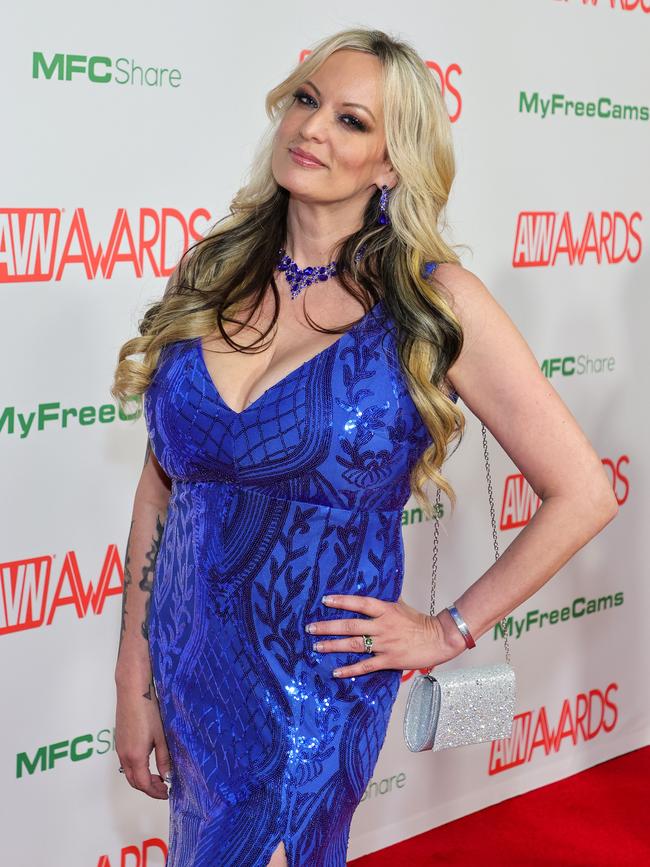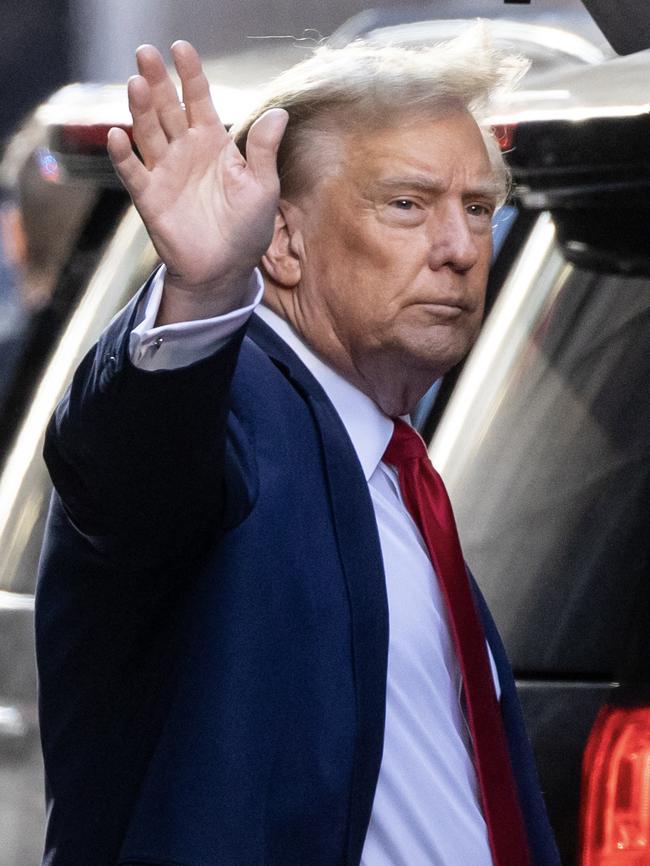Donald Trump has successfully delayed most of his criminal trials
The Republican candidate’s election lead would barely change if he were convicted in the hush money case.

On Monday (Tuesday AEST) in Manhattan, jury selection will begin for the first criminal trial of a current or former US president.
A year ago Manhattan District Attorney Alvin Bragg accused Donald Trump of making hush money payments to porn star Stormy Daniels in 2016 – to cover up an encounter that supposedly occurred in 2006 – in a way that contravened federal campaign finance laws.
Potential jurors, drawn from an island that voted around 90 per cent for Joe Biden in 2020, will be asked what media they consume and whether they have strong feelings about Trump. Prosecution and defence teams will each get the opportunity to strike out 10 jurors for a trial that is expected to last up to six weeks.

For Trump, Monday marks a perilous new phase of his battle to reclaim the White House. Will he go to prison? Will a conviction or even the spectacle of the trial itself damage his so far resilient lead in national opinion polls?
This was the first of four outstanding criminal indictments against Trump, including two – one state, one federal – related to his alleged attempts to overturn the 2020 presidential election, and one related to allegations he illegally took classified documents to his Mar-a-Lago home at Palm Beach, Florida.
It’s easy to lose track of the array of charges stacked against the former president. The criminal indictments exclude the two New York civil cases against Trump that, combined, resulted in fines of more than $US500m ($767m) for defaming E. Jean Carroll, who accused him of rape in the late 1990s, and for exaggerating the value of his business assets to obtain favourable terms.
Those two are done and dusted, pending appeals that ultimately could go to the US Supreme Court (although Trump still had to fork out almost $US200m in security bonds). The criminal trials are still in the future.
The hush money case originally was scheduled to start on March 25, and Trump’s legal team has spent the past few weeks frantically trying to delay it further. Stalling has otherwise been a successful tactic for his team.
He sued the presiding judge, Juan Merchan, over allegations Merchan was politically biased – it turns out his daughter is a Democratic Party activist. Trump also sought to have the trial moved outside Manhattan, where he might obtain a more favourable set of jurors. And he tried to delay the case so an appeals court could weigh the merits of a gag order that has muzzled Trump from attacking witnesses, prosecutors and the judge’s family.
All failed, and the trial will begin on Monday with Trump in attendance. Indeed, under New York state law Trump will have to attend the entire criminal trial in person, which will prevent him from campaigning.
But on balance Trump has been winning his legal fights, having successfully pushed back three of the criminal trials, so much so that they are unlikely to begin, let alone reach a verdict, until after the election in November.

“But remember, these trials come with a lot of earned media,” says pollster Robert Cahaly, founder of Atlanta-based Trafalgar Group, referring to the free media coverage Trump will enjoy throughout the trial, the sort that hardly has hurt him so far.
The Supreme Court enraged Democrats last month by handing Trump two significant legal victories. First it quashed attempts by some states to remove the former president from the ballot because he had “engaged in insurrection” on January 6, 2021. Second, it agreed to hear an appeal from the District of Columbia federal court over whether Trump should be immune from prosecution for acts committed as president.
“It’s hard to imagine a Supreme Court would side with Trump and say he would be immune if he tried to steal the election,” University of California, Los Angeles law professor Rick Hasan says. The Supreme Court’s decision is likely to emerge in late June after hearing oral arguments on April 25, leaving precious little time for a painfully slow justice system to schedule what would be two lengthy trials.
“It is more expedited timing than you would normally see, it’s just not as expedited as some people wanted,” Hasan says of the court’s decision.
If Trump had to pick one of the indictments to proceed to trial, it would be this hush money one, widely considered the most politically motivated and legally dubious, even by lawyers opposed to Trump. “You have to be falsifying the records to pursue some other kind of criminal activity and that seems like a stretch here,” Hasan tells Inquirer.
Prosecutors need to prove beyond reasonable doubt that Trump engineered payments of $US130,000 to Daniels via his lawyer not simply to conceal an embarrassing affair but with the intention of influencing the 2020 presidential election by not declaring a payment that prosecutors argue was a campaign-finance expense.
It will take only one juror to derail the prosecution and the statute of limitations has well passed, requiring significant legal gymnastics. In theory Trump faces up to four years in prison for each of the 34 charges against him.
“The idea that a normal defendant would face significant jail time for this seems unlikely, and then add in the fact that he’s a presidential candidate,” Hasen says, speculating on what sentence Trump might receive if he is convicted.
A national survey conducted in January by Harvard CAPS-Harris Poll found Trump’s lead over Biden in major opinion polls would reverse if he were convicted of any charges related to alleged election subversion, but his lead would barely change if he were convicted over hush money payments or wrongly taking classified documents.
A more recent poll by Ipsos conducted last month found about 50 per cent of Americans believe Trump is guilty of each of the set of charges in the four indictments but they might not care much.
Pollster Cahaly says even if Trump is convicted in the hush money trial it’s unlikely to dent his stocks.
“I certainly don’t think the hush money thing is going to have any impact on him … I mean for anyone who saw the play Hamilton there’s nothing strange about paying hush money,” he says, referring to the fact in the 18th century the first US Treasury secretary, Alexander Hamilton, paid hush money to conceal an affair.
“If Donald Trump gets convicted in New York City or Washington DC or Fulton County, Georgia, I mean, nobody is going to put a lot of stock in that because those are places where people, you know, voted against him in droves.
“What has helped him the most is that there are so many charges, which just feeds into his narrative of persecution. One prosecution would have a lot more credibility.”
It’s no exaggeration to say Trump’s indictments have powered his political revival. When he launched his campaign in November 2022, Trump was widely panned as a has-been who should make way for his younger Republican rival, Florida Governor Ron DeSantis, who was way ahead in the polls. Then 2023 brought four indictments, each boosting his standing to the point where he easily clinched the Republican nomination for president.
Karlyn Bowman, a public opinion analyst at the American Enterprise Institute, says Trump has been masterful in how he has used the indictments to his political advantage. “People have already absorbed the information, and Trump’s successfully cast himself as thumbing his nose at the establishment, the elite, and I think that’s part of what’s driving the popularity,” she says.
It’s unclear whether Democrat strategists believed the deluge of indictments would hurt Trump politically. “They might have thought very early on that these would hurt him, but I’m not sure they’re thinking that way right now,” Bowman says.
If Trump were re-elected, he would seek to pardon himself against the federal indictments. Some legal experts say the two state indictments would quietly wither away, or at least be put on hold until after his second term.
That’s especially true of the Georgia election-racketeering charges against Trump, where District Attorney Fani Willis has been humiliated and may yet stand down from the case after it emerged she had hired her former lover to be the main prosecutor. In any case, would prosecutors at that point seek to jail an 82-year-old two-time former president?



